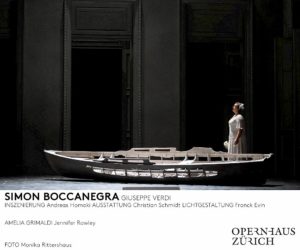French baritone Ludovic Tézier is the lead role of a the Doge of Genoa in Verdi’s dark drama Simon Boccanegra. A staging by Andreas Homoki at the Zurich Opera House.
An emotional and sombre score
Verdi’s epic Simon Boccanegra is a family tragedy interwoven with rivalry and political turmoil. Less celebrated than his other masterpieces, like Aida or Rigoletto, the opera is still one of his most powerful works and essential viewing for Verdi lovers. In this latest reincarnation, Ludovic Tézier, one of the great baritones of our time, shines.
“The path between the dressing room and going on stage, it’s a kind of void between two worlds, the world of Ludovic Tézier and the world of Simon Boccanegra,” Tézier tells Musica,
He adds: “It’s really the first step on stage where you throw yourself into the scene, where the music takes you and where you free yourself and give the character all the space.”
Brilliance in darkness
Set in Renaissance Genoa, Verdi’s opera explores treachery and the father-daughter relationship.
“Verdi lost his children when they were extremely young. So there is always a search for these lost angels and for his fatherhood that fate has stolen from him. This is extremely touching, this search, we feel it perfectly in Simon,” Tézier explains.
The heart of this dark opera is when Simon Boccanegra is reunited with his long-lost daughter who he thought had died – a moment full of conflicted emotion.
“Even though there’s this tension and there’s this pull to want to embrace, we both sort of hold back and say: Wow, that’s a lot of emotion all at once. Let’s take a step back and let’s really feel what we’re feeling and develop a relationship,” the Opera’s Soprano, Jennifer Rowley explains.
But any happiness is fleeting. Boccanegra is poisoned shortly after being reunited with his long-lost child.
“It’s as if he opens a door into a kingdom of heaven – it’s almost like a consolation. He doesn’t die in a natural way, he goes into another world. He goes into the world of his memories,” the Opera’s State Director Andreas Homoki explains.
Summing up the emotion of Verdi’s historic drama, Tézier tells us: “What music! I have a lot of tenderness for this man because of the life he had, because of the gift he gave to all of us, both to the public and to the artists that we are. Thank you Verdi!”
